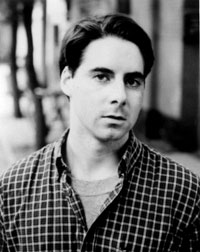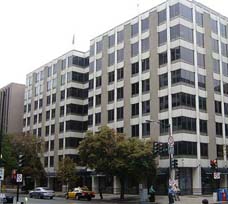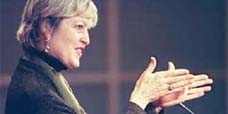2006.08.04: August 4, 2006: Headlines: Figures: COS - China: Writing - China: China Daily: In his new book, "Oracle Bones: A Journey Between China's Past and Present," Peter Hessler tells the story of the migrant workers who are part of the driving force behind China's economic rise
Peace Corps Online:
Directory:
China:
Special Report: China RPCV and Author Peter Hessler:
2006.08.04: August 4, 2006: Headlines: Figures: COS - China: Writing - China: China Daily: In his new book, "Oracle Bones: A Journey Between China's Past and Present," Peter Hessler tells the story of the migrant workers who are part of the driving force behind China's economic rise
In his new book, "Oracle Bones: A Journey Between China's Past and Present," Peter Hessler tells the story of the migrant workers who are part of the driving force behind China's economic rise

Hessler said the phenomenon of migrant workers, such as the experiences of his former students, helped inspire the book. "It (the rise of migrant workers) is the most important social development in China over the past decade," he said. "It involves such a huge number of people. "On the downside, it has seen some people live in really rough conditions or be cheated out of their wages by their bosses. But at the same time, there is an enormous number of positives, where people have been able to redefine and improve their lives." Author Peter Hessler served as a Peace Corps Volunteer in China.
In his new book, "Oracle Bones: A Journey Between China's Past and Present," Peter Hessler tells the story of the migrant workers who are part of the driving force behind China's economic rise
Migrant workers' moving stories
By Jamie Thompson (China Daily)
Updated: 2006-08-04 06:05
These days books about China are filled with numbers cold, hard statistics.
It's understandable. After all, China is the world's fastest-growing economy. At this point in its history, the nation's best storyteller is probably an accountant.
But behind the remarkable figures are stories of ordinary, everyday people.
And in his new book, "Oracle Bones: A Journey Between China's Past and Present," Peter Hessler tells the story of two such people who are part of the driving force behind China's economic rise migrant workers.
The title refers to the first known writing in China scraps of bones and shells inscribed with divinations, which date back about 3,000 years. Scholars who study the bones have tried to piece together a vision of Chinese culture back then, and Hessler said he tried to do the same with today's China by drawing together various characters.
Hessler, an American, has lived in China for about 10 years, most recently as the Beijing correspondent for The New Yorker magazine and a contributor to National Geographic magazine.
It was in his first incarnation, however, as a Peace Corps volunteer English teacher for two years from 1996 in Fuling, in Southwest China's Chongqing Municipality, where he met the two students.
One of the students featured in the book, who adopted the English name William Jefferson Foster, grows up in an illiterate family and goes on to become a teacher after leaving his small village to join the exodus of migrant workers in East China's Zhejiang Province.
The other student, whose English name is Emily, ends up working six days a week as a factory girl in Shenzhen in the southern province of Guangdong.
"I do think there are a lot of books that look at the economic side of China, and that is really important and is probably the way to view this place now," said Hessler, 37, who lives in Beijing.
"But that's an improvement from what the case was maybe five or 10 years ago, when a lot of books were heavily political.
"My book isn't about the big economic picture, but it is economic in the sense that the people that I write about are involved in the new economy here in various ways, and all of them are trying to cope with it and benefit from it."
In the past, Hessler writes, it was rare for Chinese to leave their home regions, and four-fifths of the population was rural.
But that began to change after the reform and restructuring policies initiated in the Deng Xiaoping era of the late '70s and '80s. By the late '90s, one in every 11 Chinese was on the move.
Hessler said the phenomenon of migrant workers, such as the experiences of his former students, helped inspire the book.
"It (the rise of migrant workers) is the most important social development in China over the past decade," he said. "It involves such a huge number of people.
"On the downside, it has seen some people live in really rough conditions or be cheated out of their wages by their bosses. But at the same time, there is an enormous number of positives, where people have been able to redefine and improve their lives."
The isolation sometimes felt by his former students as they head into unknown and almost alien cities is compounded by the fact they are, in a sense, pioneers. They have no historical frame of reference to guide them.
During one visit to his home village, Jefferson Foster wrote a letter to Hessler, published in the book, of how the place felt deserted.
"It makes me sad that I cannot find familiar people or friends who I knew well when I was young," wrote Jefferson Foster.
"Sometimes I think this kind of life, going out to small coastal regions without a stable home, is the saddest and the most stressful thing in the world."
He knew in his heart, he added, that he would never really return home.
Hessler said: "Most of the people who were in my class and this current generation were born when or just after Mao Zedong died in 1976, so in a very literal sense, they have grown up with these changes.
"Young people have much more freedom than they had in the past. They have more money and opportunities, but that, in turn, creates other pressures. It doesn't necessarily make life easier."
The book also strikes parallels between the lives of migrant workers and those of foreigners in China.
In one letter from Shenzhen, Emily sympathizes with Hessler's experiences of life away from home.
She writes she "cannot understand what the natives said their dialects are strange to us, because their tone and rhythm are so far different from ours."
Hessler revealed: "Many of my students migrated to find work, and many of them have written similar letters to me at some point.
"It reflects the diversity there is in the country, but it is a really important experience for them and their individuality. It can be hard and traumatic, but it's a positive experience."
He said that he hoped the book can provide more of a human perspective and understanding of China, something he thinks is needed, particularly in the United States.
"I actually think it would be a good thing for people in America to do something like the migrant workers have done, go abroad to a new place and be in a different environment with a different language," Hessler said.
"They would return and be able to see things from a different perspective."
(Oracle Bones is available at Beijing's Bookworm Cafe.)
When this story was posted in August 2006, this was on the front page of PCOL:





Peace Corps Online The Independent News Forum serving Returned Peace Corps Volunteers
 | The Peace Corps is "fashionable" again
The LA Times says that "the Peace Corps is booming again and "It's hard to know exactly what's behind the resurgence." PCOL Comment: Since the founding of the Peace Corps 45 years ago, Americans have answered Kennedy's call: "Ask not what your country can do for you--ask what you can do for your country. My fellow citizens of the world: ask not what America will do for you, but what together we can do for the freedom of man." Over 182,000 have served. Another 200,000 have applied and been unable to serve because of lack of Congressional funding. The Peace Corps has never gone out of fashion. It's Congress that hasn't been keeping pace. |
 | Changing the Face of Hunger
In his new book, Former Congressman Tony Hall (RPCV Thailand) says humanitarian aid is the most potent weapon the United States can deploy against terrorism. An evangelical Christian, he is a big believer in faith-based organizations in the fight against hunger. Members of Congress have recently recommended that Hall be appointed special envoy to Sudan to focus on ending the genocide in Darfur. |
 | PC will not return to East Timor in 2006
Volunteers serving in East Timor have safely left the country as a result of the recent civil unrest and government instability. Latest: The Peace Corps has informed us that at this time, the Peace Corps has no plans to re-enter the country in 2006. The Peace Corps recently sent a letter offering eligible volunteers the opportunity to reinstate their service in another country. |
 | Chris Dodd considers run for the White House
Senator Chris Dodd plans to spend the next six to eight months raising money and reaching out to Democrats around the country to gauge his viability as a candidate. Just how far Dodd can go depends largely on his ability to reach Democrats looking for an alternative to Hillary Clinton. PCOL Comment: Dodd served as a Volunteer in the Dominican Republic and has been one of the strongest supporters of the Peace Corps in Congress. |
 | Vasquez testifies before Senate Committee
Director Vasquez testifies before the Senate Foreign Relations Committee on his nomination as the new Representative to the United Nations Agencies for Food and Agriculture replacing Tony Hall. He has been the third longest serving Peace Corps Director after Loret Ruppe Miller and Sargent Shriver. PCOL Comment: Read our thanks to Director Vasquez for his service to the Peace Corps. |
 | Interview with a Hit Man
RPCV John Perkins says that for many years he was an "economic hit man" in the world of international finance whose primary job was to convince less developed countries to accept multibillion dollar loans for infrastructure projects that left the recipient countries wallowing in debt and highly vulnerable to outside political and commercial interests. In this exclusive interview for "Peace Corps Online," Colombia RPCV Joanne Roll, author of Remember with Honor, talks to Perkins about his Peace Corps service, his relation with the NSA, "colonization" in Ecuador, the consequences of his work, why he decided to speak out, and what his hopes are for change. |
 | Peace Corps stonewalls on FOIA request
The Ashland Daily Tidings reports that Peace Corps has blocked their request for information on the Volkart case. "After the Tidings requested information pertaining to why Volkart was denied the position — on March 2 — the newspaper received a letter from the Peace Corps FOIA officer stating the requested information was protected under an exemption of the act." The Dayton Daily News had similar problems with FOIA requests for their award winning series on Volunteer Safety and Security. |
 | PCOL readership increases 100%
Monthly readership on "Peace Corps Online" has increased in the past twelve months to 350,000 visitors - over eleven thousand every day - a 100% increase since this time last year. Thanks again, RPCVs and Friends of the Peace Corps, for making PCOL your source of information for the Peace Corps community. And thanks for supporting the Peace Corps Library and History of the Peace Corps. Stay tuned, the best is yet to come. |
 | History of the Peace Corps
PCOL is proud to announce that Phase One of the "History of the Peace Corps" is now available online. This installment includes over 5,000 pages of primary source documents from the archives of the Peace Corps including every issue of "Peace Corps News," "Peace Corps Times," "Peace Corps Volunteer," "Action Update," and every annual report of the Peace Corps to Congress since 1961. "Ask Not" is an ongoing project. Read how you can help. |
 | RPCV admits to abuse while in Peace Corps
Timothy Ronald Obert has pleaded guilty to sexually abusing a minor in Costa Rica while serving there as a Peace Corps volunteer. "The Peace Corps has a zero tolerance policy for misconduct that violates the law or standards of conduct established by the Peace Corps," said Peace Corps Director Gaddi H. Vasquez. Could inadequate screening have been partly to blame? Mr. Obert's resume, which he had submitted to the Peace Corps in support of his application to become a Peace Corps Volunteer, showed that he had repeatedly sought and obtained positions working with underprivileged children. Read what RPCVs have to say about this case. |
 | Why blurring the lines puts PCVs in danger
When the National Call to Service legislation was amended to include Peace Corps in December of 2002, this country had not yet invaded Iraq and was not in prolonged military engagement in the Middle East, as it is now. Read the story of how one volunteer spent three years in captivity from 1976 to 1980 as the hostage of a insurrection group in Colombia in Joanne Marie Roll's op-ed on why this legislation may put soldier/PCVs in the same kind of danger. Latest: Read the ongoing dialog on the subject. |
Read the stories and leave your comments.

Some postings on Peace Corps Online are provided to the individual members of this group without permission of the copyright owner for the non-profit purposes of criticism, comment, education, scholarship, and research under the "Fair Use" provisions of U.S. Government copyright laws and they may not be distributed further without permission of the copyright owner. Peace Corps Online does not vouch for the accuracy of the content of the postings, which is the sole responsibility of the copyright holder.
Story Source: China Daily
This story has been posted in the following forums: : Headlines; Figures; COS - China; Writing - China
PCOL33960
42


























